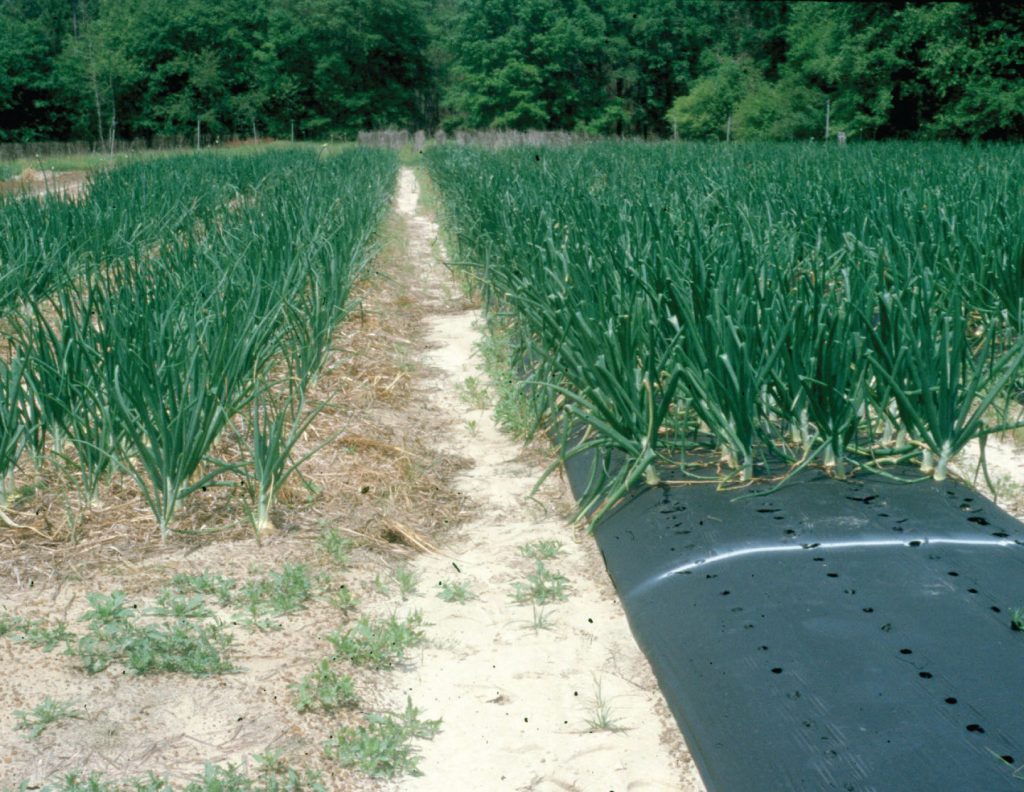
By Juan Carlos Díaz-Pérez
For centuries, horticulturists have modified the crop microenvironment to extend the production season and enhance crop growth, yield and quality. Some of the techniques to achieve environmental modification include the use of mulches, high tunnels, greenhouses, etc.
Mulches are widely used in both conventional and organic vegetable production. According to Wikipedia, “a mulch is a layer of material applied to the surface of soil with the goal of conserving soil moisture, improving fertility and health of the soil, and reducing weed growth.”
Mulch may be organic (straw, leaves, cover crop residue, newspaper, wood chips, etc.) or inorganic, such as plastic film. Mulch effects on crops may vary depending on different factors.
Factors affecting organic mulches include source of organic material (plant or animal), size of the particle, thickness of the mulch (amount applied) and age of the material. Factors affecting plastic mulch films include color, thickness, composition and permeability.
In a vegetable crop field, soil water may be: 1) evaporated from the soil, 2) evaporated from the surface of the leaves of the crop, in a process called transpiration, 3) lost from surface runoff or 4) lost by percolation. In this article, we will focus on ways to improve soil water conservation.
SOIL WATER EVAPORATION
Both organic mulches and plastic mulch films act as barriers to water evaporation from the soil. These two types of mulches differ, however, in how they diminish soil water evaporation.
In bare soil, water tends to evaporate from the soil. Soil water evaporation is proportional to the evaporative demand. Evaporation increases with increasing air and soil temperatures and decreasing relative humidity. The rate of soil water evaporation also decreases as the soil water content decreases.
According to the Food and Agriculture Organization of the United Nations, organic mulches may reduce soil water evaporation from 40 to 90 percent relative to bare soil. A thickness of 2 to 4 inches is effective in reducing evaporation. Soil evaporation tends to decrease with decreasing particle size of organic residues.
Plastic mulch films are, in general, more effective in reducing soil water evaporation compared to organic mulches. Plastic mulch films differ in permeability to gases due to differences in film composition. For example, virtually impermeable film and totally impermeable film provide greater fumigant retention compared to low-density and high-density polyethylene film. With respect to soil evaporation, however, all plastic mulch films seem to be effective in conserving soil moisture.
Physical damage or deterioration decrease the effectiveness of a plastic film to reduce soil water evaporation. Biodegradable mulches may be more prone to rapid deterioration compared to plastic mulch films.
RAINFALL PENETRATION INTO SOIL
Water-use efficiency increases when the crop uses rainfall water. Although organic mulches reduce soil evaporation, they allow for water penetration to the soil after a rainfall event. In fact, by reducing water flow through the soil surface and improving soil structure, organic mulches improve the water penetration to the soil and reduce soil runoff compared to bare soil.
In contrast to organic mulches, plastic mulch films are impermeable to liquid water. Thus, they do not allow rainfall water penetration into the soil covered by the film. Rainwater that reaches the plastic film flows to the soil area between the beds and may result in soil runoff and soil erosion.
In conclusion, both organic mulches and plastic mulch films are useful tools that help growers conserve soil moisture and increase irrigation efficiency.









